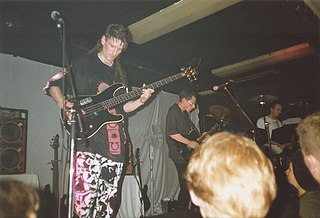House is a genre of electronic dance music characterized by a repetitive four-on-the-floor beat and a typical tempo of 120 to 130 beats per minute. It was created by DJs and music producers from Chicago's underground club culture in the 1980s, as DJs from the subculture began altering disco songs to give them a more mechanical beat and deeper basslines.

Tresor is an underground techno nightclub in Berlin and a record label.
Detroit techno is a type of techno music that generally includes the first techno productions by Detroit-based artists during the 1980s and early 1990s. Prominent Detroit techno artists include Juan Atkins, Eddie Fowlkes, Derrick May, Jeff Mills, Kevin Saunderson, Blake Baxter, Drexciya, Mike Banks, and Robert Hood.

Juan Atkins, also known as Model 500 and Infiniti, is an American record producer and DJ from Detroit, Michigan. Mixmag has described him as "the original pioneer of Detroit techno." He has been a member of The Belleville Three, Cybotron, and Borderland.

Derrick May, also known as Mayday and Rhythim Is Rhythim, is an electronic musician from Belleville, Michigan, United States. May is credited with pioneering techno music in the 1980s along with collaborators Juan Atkins and Kevin Saunderson, commonly known as the Belleville Three.
Cybotron was an American electro music group formed in 1980 by Juan Atkins and Richard "3070" Davis in Detroit. Guitarist John "Jon 5" Housely joined soon afterward. Cybotron had a number of singles now considered classics of the electro genre, particularly "Clear" and the group's debut, "Alleys of Your Mind," as well as "Cosmic Cars" and "R-9".
Kevin Maurice Saunderson is an American electronic music producer. At the age of nine he moved to Belleville, Michigan, a suburb of Detroit where he attended Belleville High School and befriended two students, Derrick May and Juan Atkins. Saunderson, with Atkins and May, is considered to be one of the originators of techno, specifically Detroit techno.

The Infiniti M is a line of mid-size luxury (executive) cars from the Infiniti luxury division of Nissan. From 2013 on it has been marketed as the Infiniti Q70, reflecting the company's new naming scheme.

The Shamen were a Scottish electronic dance music band, formed in 1985 in Aberdeen. The founding members were Colin Angus, Derek McKenzie and Keith McKenzie. Peter Stephenson joined shortly after to take over on keyboards from Angus. Several other people were later in the band. Angus then teamed up with Will Sinnott, and together they found credibility as pioneers of rock/dance crossover. When Mr. C joined, the band moved on to international commercial success with "Ebeneezer Goode" and their 1992 Boss Drum album.
Christian Jay "C. J." Bolland is an English-Belgian electronic music producer and remixer with British roots.
Network Records was an independent record label founded in Birmingham, England, in 1988 by Neil Rushton and Dave Barker.

The Belleville Three is a group credited with inventing the musical style known as Detroit techno. The group consists of Juan Atkins, Derrick May and Kevin Saunderson.
Blake Baxter is an American techno musician, associated with the first wave of Detroit techno. AllMusic called him "perhaps the most underrated figure" of the early Detroit techno scene.
Eddie Fowlkes is a techno DJ from Detroit, Michigan, influential to the early Detroit techno scene.
430 West Records is an independent record label based in Detroit, Michigan, United States, formed in 1990 by Lawrence Burden, Lenny Burden, and Lynell Burden, just months after recording their debut record for Derrick Mays' Transmat label. 430 West was formed as an outlet for the Burden Brothers' own productions. Later it was expanded to be the home for releases by electronic music artists Jay Denham, Terrence Parker, Eddie Fowlkes, Aux 88, Wild Planet, and Gerald Mitchell, among others. In 1998, 430 West also became the musical home for the trio's youngest brothers, Lance Burden and Lorne Burden.
Techno is a genre of electronic dance music (EDM) that is predominantly characterized by a repetitive and hard four on the floor beat which is generally produced for use in a continuous DJ set. The central rhythm is often in common time (4/4), while the tempo typically varies between 120 and 150 beats per minute (bpm). Artists may use electronic instruments such as drum machines, sequencers, and synthesizers, as well as digital audio workstations. Drum machines from the 1980s such as Roland's TR-808 and TR-909 are highly prized, and software emulations of such retro instruments are popular.
Ian Garfield Hoxley, known by his stage name Mary Byker, is an English singer, record producer and DJ known for his work as the lead singer of Gaye Bykers on Acid, Pop Will Eat Itself, Pigface and Apollo 440.
Digital Solutions is the third studio album by Juan Atkins as Model 500. It was released by Metroplex on February 18, 2015. It is his first studio album under the pseudonym in 16 years, following from Deep Space (1995) and Mind and Body (1999). It includes additional production from Mike Banks.

Classics is a compilation album by Juan Atkins under the alias of Model 500. It was released in 1993 by R&S Records.

"No UFO's" is a 1985 techno song by Juan Atkins under the alias of Model 500. It was released on Atkins own label Metroplex. The song was the first track released after the split of Atkins' previous group Cybotron. The music followed similar themes of the previous group with science fiction and alienation but featured less of a song structure than Cybotron's music leading the track to be often identified as one of the earliest techno songs.







